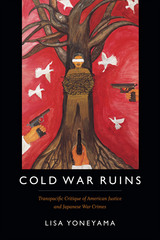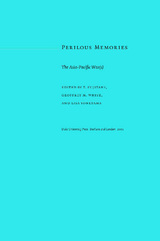2 books about Yoneyama, Lisa

Cold War Ruins
Transpacific Critique of American Justice and Japanese War Crimes
Lisa Yoneyama
Duke University Press, 2016
In Cold War Ruins Lisa Yoneyama argues that the efforts intensifying since the 1990s to bring justice to the victims of Japanese military and colonial violence have generated what she calls a "transborder redress culture." A product of failed post-World War II transitional justice that left many colonial legacies intact, this culture both contests and reiterates the complex transwar and transpacific entanglements that have sustained the Cold War unredressability and illegibility of certain violences. By linking justice to the effects of American geopolitical hegemony, and by deploying a conjunctive cultural critique—of "comfort women" redress efforts, state-sponsored apologies and amnesties, Asian American involvement in redress cases, the ongoing effects of the U.S. occupation of Japan and Okinawa, Japanese atrocities in China, and battles over WWII memories—Yoneyama helps illuminate how redress culture across Asia and the Pacific has the potential to bring powerful new and challenging perspectives on American exceptionalism, militarized security, justice, sovereignty, forgiveness, and decolonization.
[more]

Perilous Memories
The Asia-Pacific War(s)
T. Fujitani, Geoffrey M. White, Lisa Yoneyama, eds.
Duke University Press, 2001
Perilous Memories makes a groundbreaking and critical intervention into debates about war memory in the Asia-Pacific region. Arguing that much is lost or erased when the Asia-Pacific War(s) are reduced to the 1941–1945 war between Japan and the United States, this collection challenges mainstream memories of the Second World War in favor of what were actually multiple, widespread conflicts. The contributors recuperate marginalized or silenced memories of wars throughout the region—not only in Japan and the United States but also in China, Southeast Asia, the Pacific Islands, Okinawa, Taiwan, and Korea.
Firmly based on the insight that memory is always mediated and that the past is not a stable object, the volume demonstrates that we can intervene positively yet critically in the recovery and reinterpretation of events and experiences that have been pushed to the peripheries of the past. The contributors—an international list of anthropologists, cultural critics, historians, literary scholars, and activists—show how both dominant and subjugated memories have emerged out of entanglements with such forces as nationalism, imperialism, colonialism, racism, and sexism. They consider both how the past is remembered and also what the consequences may be of privileging one set of memories over others. Specific objects of study range from photographs, animation, songs, and films to military occupations and attacks, minorities in wartime, “comfort women,” commemorative events, and postwar activism in pursuing redress and reparations.
Perilous Memories is a model for war memory intervention and will be of interest to historians and other scholars and activists engaged with collective memory, colonial studies, U.S. and Asian history, and cultural studies.
Firmly based on the insight that memory is always mediated and that the past is not a stable object, the volume demonstrates that we can intervene positively yet critically in the recovery and reinterpretation of events and experiences that have been pushed to the peripheries of the past. The contributors—an international list of anthropologists, cultural critics, historians, literary scholars, and activists—show how both dominant and subjugated memories have emerged out of entanglements with such forces as nationalism, imperialism, colonialism, racism, and sexism. They consider both how the past is remembered and also what the consequences may be of privileging one set of memories over others. Specific objects of study range from photographs, animation, songs, and films to military occupations and attacks, minorities in wartime, “comfort women,” commemorative events, and postwar activism in pursuing redress and reparations.
Perilous Memories is a model for war memory intervention and will be of interest to historians and other scholars and activists engaged with collective memory, colonial studies, U.S. and Asian history, and cultural studies.
Contributors. Chen Yingzhen, Chungmoo Choi, Vicente M. Diaz, Arif Dirlik, T. Fujitani, Ishihara Masaie, Lamont Lindstrom, George Lipsitz, Marita Sturken, Toyonaga Keisaburo, Utsumi Aiko, Morio Watanabe, Geoffrey M. White, Diana Wong, Daqing Yang, Lisa Yoneyama
[more]
READERS
Browse our collection.
PUBLISHERS
See BiblioVault's publisher services.
STUDENT SERVICES
Files for college accessibility offices.
UChicago Accessibility Resources
home | accessibility | search | about | contact us
BiblioVault ® 2001 - 2024
The University of Chicago Press









